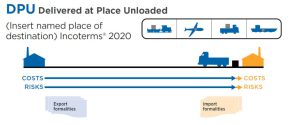The DPU represents a new feature of the 2020 Incoterms. This term has replaced the DAT Incoterm (Delivered at Terminal) which was first introduced under the 2010 Incoterms. Ironically, DAT had replaced DEQ Incoterm (Delivered ex Quay) established under the 2000 Incoterms .

According to the DPU, the delivery of the goods to the buyer happens when the goods are unloaded from the transportation vehicle and put at the disposal of the buyer at the place of destination. Nevertheless, DAT is the only Incoterm “that requires the seller to unload goods at destination”.
The seller bears the risk until it has unloaded the goods at the place of destination. In addition, the seller undertakes to conclude a contract for carriage or arrange carriage at its own expense. It also has an obligation to clear the goods for export. Yet, no such obligation is imposed for import. The buyer is required to assist the seller in obtaining relevant documentation for export clearance formalities, at the seller’s expenses.
DAT shipping terms were updated in 2020 to be more efficient and cover different means of transport. Delivered at Terminal established the terminal as the only possible designated unloading point, whereas DPU 2020 allows the buyer to designate any location at their convenience. This makes the Delivered at Place Unloaded much more general than Delivered at Terminal. When shipping under the DPU Incoterm, delivery can occur in any location, be it a warehouse, a terminal or a roadside. Contrary to the CIP Incoterm, the seller (or the buyer) has no obligation to contract insurance under the DPU Incoterm.





